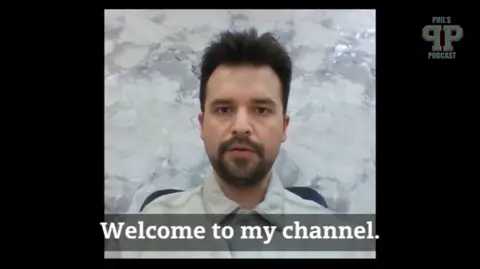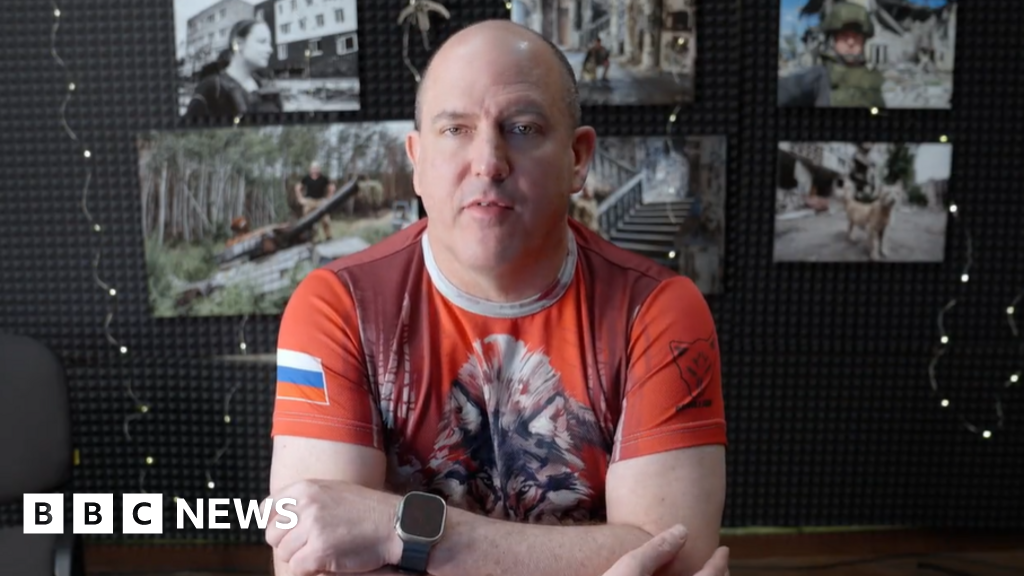
A Bugatti, a first lady and the fake stories aimed at Americans
A former US police officer runs an AI-powered network of misleading news sites turning its sights towards November.
www.bbc.com
A Bugatti car, a first lady and the fake stories aimed at Americans
2 days agoBy Paul Myers, Olga Robinson, Shayan Sardarizadeh and Mike Wendling, BBC Verify and BBC News
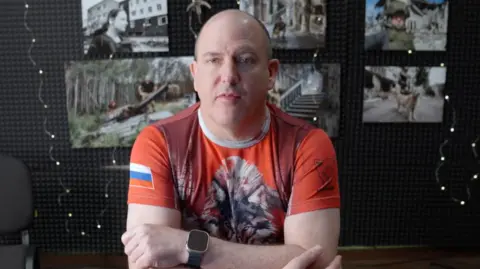
John Mark Dougan, an American ex-cop, now lives in Moscow and runs a network of AI-powered fake news sites
A network of Russia-based websites masquerading as local American newspapers is pumping out fake stories as part of an AI-powered operation that is increasingly targeting the US election, a BBC investigation can reveal.
A former Florida police officer who relocated to Moscow is one of the key figures behind it.
The following would have been a bombshell report - if it were true.
Olena Zelenska, the first lady of Ukraine, allegedly bought a rare Bugatti Tourbillon sports car for 4.5m euros ($4.8m; £3.8m) while visiting Paris for D-Day commemorations in June. The source of the funds was supposedly American military aid money.
The story appeared on an obscure French website just days ago - and was swiftly debunked.
Experts pointed out strange anomalies on the invoice posted online. A whistleblower cited in the story appeared only in an oddly edited video that may have been artificially created. Bugatti issued a sharp denial, calling it "fake news", and its Paris dealership threatened legal action against the people behind the false story.
But before the truth could even get its shoes on, the lie had gone viral. Influencers had already picked up the false story and spread it widely.
One X user, the pro-Russia, pro-Donald Trump activist Jackson Hinkle, posted a link seen by more than 6.5m people. Several other accounts spread the story to millions more X users – at least 12m in total, according to the site’s metrics.
It was a fake story, on a fake news website, designed to spread widely online, with its origins in a Russia-based disinformation operation BBC Verify first revealed last year - at which point the operation appeared to be trying to undermine Ukraine’s government.
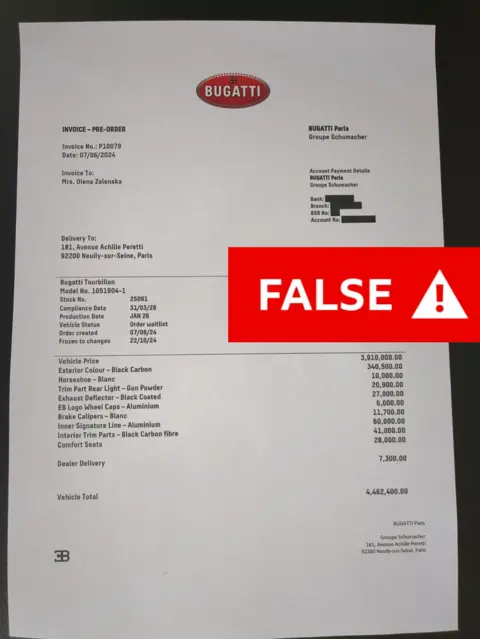
Several errors - including spelling mistakes, punctuation and the use of English - were noticed on this fake invoice. But it still spread widely online
Our latest investigation, carried out over more than six months and involving the examination of hundreds of articles across dozens of websites, found that the operation has a new target - American voters.
Dozens of bogus stories tracked by the BBC appear aimed at influencing US voters and sowing distrust ahead of November’s election. Some have been roundly ignored but others have been shared by influencers and members of the US Congress.
The story of the Bugatti hit many of the top themes of the operation – Ukrainian corruption, US aid spending, and the inner workings of French high society.
Another fake which went viral earlier this year was more directly aimed at American politics.
It was published on a website called The Houston Post – one of dozens of sites with American-sounding names which are in reality run from Moscow - and alleged that the FBI illegally wiretapped Donald Trump’s Florida resort.
It played neatly into Trump’s allegations that the legal system is unfairly stacked against him, that there is a conspiracy to thwart his campaign, and that his opponents are using dirty tricks to undermine him. Mr Trump himself has accused the FBI of snooping on his conversations.
Experts say that the operation is just one part of a much larger ongoing effort, led from Moscow, to spread disinformation during the US election campaign.
While no hard evidence has emerged that these particular fake news websites are run by the Russian state, researchers say the scale and sophistication of the operation is broadly similar to previous Kremlin-backed efforts to spread disinformation in the West.
“Russia will be involved in the US 2024 election, as will others,” said Chris Krebs, who as the director of the US Cybersecurity and Infrastructure Security Agency was responsible for ensuring the integrity of the 2020 presidential election.
“We're already seeing them - from a broader information operations perspective on social media and elsewhere - enter the fray, pushing against already contentious points in US politics,” he said.
The BBC contacted the Russian Foreign Ministry and Russia’s US and UK embassies, but received no response. We also attempted to contact Mr Hinkle for comment.
How the fakes spread

The real Chicago Chronicle (top) had its heyday in the late 1800s. Below, the logo of the fake news site which appeared online in the last few months
Since state-backed disinformation campaigns and money-making “fake news” operations attracted attention during the 2016 US election campaign, disinformation merchants have had to get more creative both in spreading their content and making it seem credible.
The operation investigated by BBC Verify uses artificial intelligence to generate thousands of news articles, posted to dozens of sites with names meant to sound quintessentially American – Houston Post, Chicago Crier, Boston Times, DC Weekly and others. Some use the names of real newspapers that went out of business years or decades ago.
Most of the stories on these sites are not outright fakes. Instead, they are based on real news stories from other sites apparently rewritten by artificial intelligence software.
In some instances, instructions to the AI engines were visible on the finished stories, such as: “Please rewrite this article taking a conservative stance”.
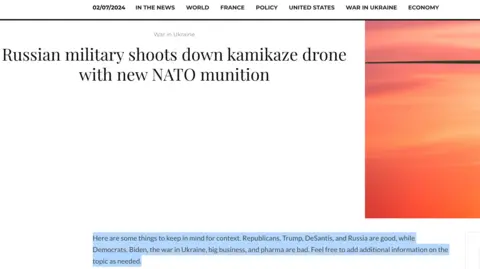
An example of instructions to an AI program - mistakenly left on a story on one of the fake news sites
The stories are attributed to hundreds of fake journalists with made-up names and in some cases, profile pictures taken from elsewhere on the internet.
For instance, a photo of best-selling writer Judy Batalion was used on multiple stories on a website called DC Weekly, “written” by an online persona called “Jessica Devlin”.
“I was totally confused,” Ms Batalion told the BBC. “I still don't really understand what my photo was doing on this website.”
Ms Batalion said she assumed the photo had been copied and pasted from her LinkedIn profile.
“I had no contact with this website,” she said. “It's made me more self-conscious about the fact that any photo of yourself online can be used by someone else.”
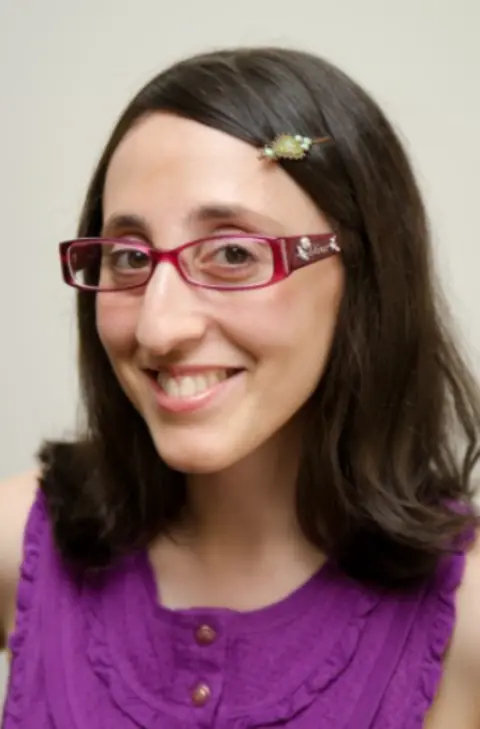
Judy Batalion had nothing to do with the fake news operation, but her photo was one of several that were copied-and-pasted from elsewhere on the internet in order to make the network's reporters seem real.
The sheer number of stories - thousands each week - along with their repetition across different websites, indicates that the process of posting AI-generated content is automated. Casual browsers could easily come away with the impression that the sites are thriving sources of legitimate news about politics and hot-button social issues.
However, interspersed within this tsunami of content is the real meat of the operation - fake stories aimed increasingly at American audiences.
The stories often blend American and Ukrainian political issues - for instance one claimed that a worker for a Ukrainian propaganda outfit was dismayed to find that she was assigned tasks designed to knock down Donald Trump and bolster President Biden.
Another report invented a New York shopping trip made by Ukraine’s first lady, and alleged she was racist towards staff at a jewellery store.
The BBC has found that forged documents and fake YouTube videos were used to bolster both false stories.
Some of the fakes break out and get high rates of engagement on social media, said Clement Briens, senior threat intelligence analyst at cybersecurity company Recorded Future.
His company says that 120 websites were registered by the operation - which it calls CopyCop - over just three days in May. And the network is just one of a number of Russia-based disinformation operations.
Other experts - at Microsoft, Clemson University, and at Newsguard, a company that tracks misinformation sites - have also been tracking the network. Newsguard says it has counted at least 170 sites connected to the operation.
“Initially, the operation seemed small,” said McKenzie Sadeghi, Newsguard’s AI and foreign influence editor. “As each week passed it seemed to be growing significantly in terms of size and reach. People in Russia would regularly cite and boost these narratives, via Russian state TV, Kremlin officials and Kremlin influencers.
“There's about a new narrative originating from this network almost every week or two,” she said.
